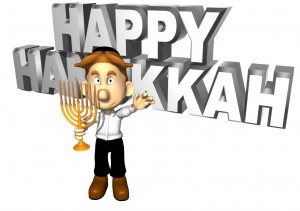This year Hanukkah starts on the night of Wednesday, November 27 and ends on Wednesday, December 5. (For free, printable monthly calendars, go to http://hoshanarabbah.org/calendars.html.)
In some Messianic circles, more is made of Hanukkah than the biblical feasts. This is wrong.
In some Messianic circles, Hanukkah (and Purim) is listed along with the biblical feasts giving the impression that this holiday is equal to or only slightly less important than the biblical feasts. This also is wrong.
Hanukkah is mentioned only once in the Scriptures, in the Gospels, by it’s English name — the Feast of the Dedication (John 10:22). There we read that Yeshua was at the temple in Jerusalem during this holiday. This scripture doesn’t say whether he was celebrating it or not, so we don’t know.
In a certain sense, Hanukkah was to the ancient Jews what the Fourth of July or Thanksgiving is to Americans — a secular holiday commemorating a historical event. It is true that the same could be said for many of the biblical feasts as well. The difference is that YHVH commanded the observance of the biblical feasts, while Hanukkah is purely an invention of men with no biblical command to celebrate it.
Many who are new to the Hebrew roots faith attach an unwarranted emphasis on Hanukkah. This is likely due to the fact that it is a shock for them to learn about the pagan origins of Christmas, and the difficulty they face of letting go of this traditional Christian holiday. Because of Hanukkah’s coincidental proximity to Christmas, often Hanukkah becomes a de facto replacement for Christmas in the minds of some. Though well-intentioned, this is misguided thinking.
As one begins one’s spiritual journey into the Hebrew roots of the Christian faith, initially, the discovery of Hanukkah can be an exciting diversion from all the emphasis placed on Christmas. For those who are dealing with family members who are miffed at them because they are no longer joining them for the family Christmas celebrations, Hanukkah becomes a convenient “out” as a sort of Jewish replacement for Christmas. However, as one progresses in one’s spiritual journey into the Hebrew or biblical roots of our faith, for many, as they learn of the significant importance of the biblical feasts, and as one begins to properly celebrate them, Hanukkah becomes less important, and finds its rightful place as simply another man-made holiday — though with some deep spiritual implications.
In no way am I suggesting that we not celebrate Hanukkah. If it had not been for the Maccabee revolt that kicked the Greek pagans out of the holy land, it is quite possible that Yeshua, the true Light of the world, would not have been born. Therefore, one should properly view this revolt as Elohim-ordained in order to rid the holy land of Greek control resulting in that region remaining in Jewish hands, so that the Messiah could be born into a proper Jewish environment thus fulfilling the Bible prophecies about him. Had the Greeks had their way, the Jewish culture and religion, if not the Jewish people, would have been exterminated making it all but impossible for the coming of Messiah, and thus the fulfillment of the many biblical prophecies about him, and his becoming the Savior of the world as Elohim’s plan of salvation required.
What’s more, Hanukkah was about the Jews rejecting assimilation with the pagan cultural practices around them, and staying true to the Word of Elohim as revealed in the Bible, which is a good thing to celebrate. This is something the Bible commands us to do in many places (e.g. Exod 23:32; Deut 7:2; Judg 2:2; Rev 4:4; 2 Cor 6:14–17). This is why YHVH led his people out of Egypt in the first place, and why he punished them for turning away from him to the pagan practices of the nations around them.
Therefore, if and when we celebrate Hanukkah, let’s keep all these things in mind so that we can do so in a correct and balanced manner.


